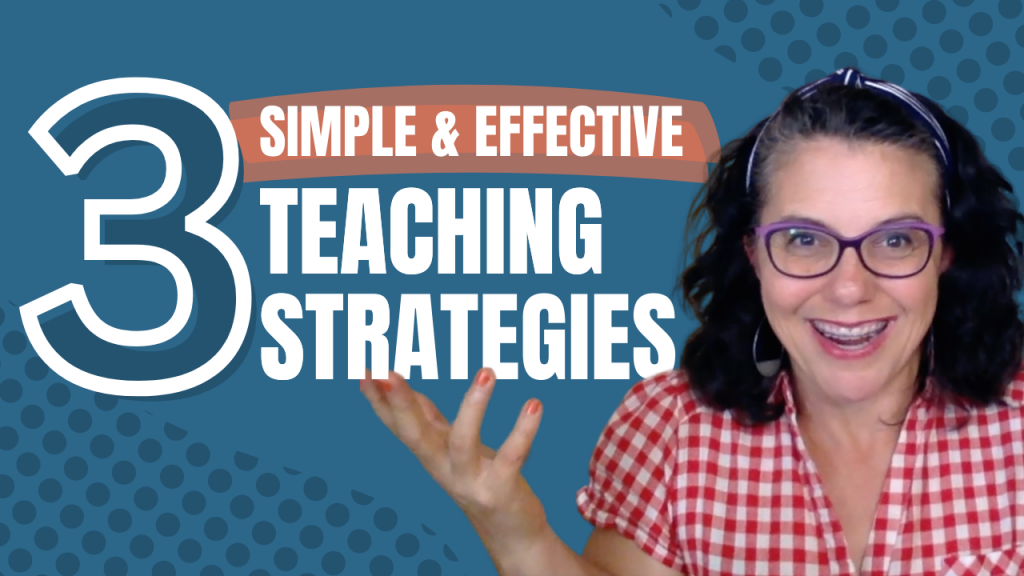Are you a teacher who is an expert in whatever field you were trained in? Maybe it’s something to do with the medical profession. Maybe it’s something that you learned to do really well in college, and now you’re a teacher, but you have never actually been trained in how to teach.
I’ve noticed this as a theme in a lot of the schools that are reaching out to me for support and also in a lot of the individual educators who are reaching out for support from me right now. For example, a graduate student came to my recent master class on study skills because they wanted the tools for themselves, but also because they wanted to use them to teach their students, since graduate students typically are people who do a lot of teaching, as well. I was thrilled they came to me, and it inspired this post!
Today we’re going to talk about three simple techniques you can start using right now to be an incredibly effective teacher––whether or not you’ve been trained as an educator!
Let’s dig in!
TIP #1: Insert 30-second retrieval practice breaks frequently during a lecture.
Retrieval practice is the fancy terminology neuroscientists use to describe the process the brain goes through when it tests itself to see what it knows and what it doesn’t know.
This does not mean a graded quiz! This means quick, little moments of retrieval practice sprinkled throughout a lecture or teaching session. To help yourself remember, you can even insert in your PowerPoint slide deck a slide that just says “Retrieval Practice.” Whenever that slide comes up, you know it’s an opportunity to ask your students a question. Tell them not to look at their notes and just see if they know the answer. It’s okay if they don’t know! It’s the practice of trying to retrieve that teaches students.
TIP #2: Don’t just ask questions of the whole class
You could interpret Tip #1 as me telling you to do that, but don’t! Instead, design interactions that “trick” everyone into trying to recall whatever the thing is.
One simple example is to just have students write their answer to the retrieval practice question down on a sheet of paper and hold that sheet of paper up. That requires them to write it down, and while you may not be able to read the answers from afar, at least you can see when everybody’s holding up a sheet of paper.
I’m working with a school right now that is purchasing whiteboards and erasable markers for all of their students to use in these retrieval practice sessions. To have a classroom set of whiteboards where students write the answer really big on the whiteboard and hold it up is actually an even better way (than paper) to do 30-second retrieval practices that encourage students to take action during a lecture.
Try really hard not just to ask the whole class and wait for the first hand that goes up! Another thing you could do is cycle through all the names in the class, and just make sure you’re doing that through several class periods. But, even then, if a student isn’t called upon, they’re probably going to relax their brain and not answer even in their own minds. We want to trick everyone to try to answer in each of the retrieval practices.
TIP #3: Learn to talk like a coach, not just a teacher
This third tip is on a slightly different theme, but I feel like this is imperative. I’m doing a lot of teacher coaching right now inside institutions, and one of the things I’m seeing is that teachers don’t know how to actually use emotion-based language with their students. Learning how to talk like a coach, not just a teacher, is actually a really important skill.
For this one I invite you to go to my website where I have a free resource all about how to use what I call the Consent Burger. It’s a three-step process with a top bun, the inner burger, and a lower bun to help you practice allowing students’ consent into why they’re there and why they might even want to hear what you have to share.
So give it a try, y’all: 30 second retrieval practice breaks, designing interactions that encourage everyone to try to answer all at the same time, and then learn to talk like a coach––not just a teacher––with a consent burger.
If you put one or more of these into action, I guarantee you’ll start feeling like an even more effective teacher…even if you haven’t been trained exactly how to teach.
If you would like to actually try some things out and then ask me questions live, for free, you can sign up for my next office hours, and I would be so happy to have a little chit chat with you about what you’re learning when you try these techniques in the classroom or in your one-on-one sessions with students.
Today, this post happens to be coming out on my 49th birthday! You could give me the best present in the world by clicking the Like, subscribing to my weekly newsletter, or leaving a comment below. The more you interact with this post, the more I show up in the algorithms and the more people get to see these really useful tips––so thank you in advance for the little birthday present, and I will see you in the next post!
Take care, y’all!

P.S. Prefer to watch my tips on video? You can find this video and subscribe to my YouTube channel here!


Happy Birthday, Gretchen! I hope you are seeing/hearing/being treated to lots of appreciation for your life and impact. I wish you a wonderful year of deep learning, great joy, and doing both in the best of company.
Thank you so much, Annika! Lovely wishes!!